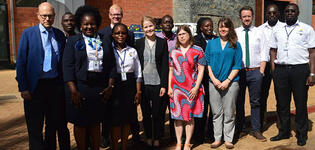Blog
Ending aid dependency
Taxation in developing countries can be improved through collaboration
Finland aims to raise the amount of its development assistance to 0.7% of GDP, and this goal has good grounds. But how can we make sure that the countries receiving the donor funding will not stay dependent on the external aid for a long time?
Just like rich countries, in the long run developing countries also need to be able to fund necessary public spending on education, health services, and redistribution of income with tax revenues. In Africa and other developing regions the tax-to-GDP ratios were growing prior to the pandemic, but their level continues to be modest, about 15% of GDP in sub-Saharan Africa (SSA). In Finland the tax-to-GDP rate is 42%. Obviously the appropriate level of taxation is a political choice, but with the level seen in SSA countries will not be able to provide citizens with necessary public services.
To change the situation many donor countries have started to support the taxation ability of poor countries as part of their development co-operation programmes. In 2015 in Addis Ababa many countries, including Finland, committed to double their support for developing the taxation in the Global South. The aim of Finland has been to attain this level, approximately 9 million euros, by 2022.
 But what is the reason for the low tax rates in poor countries? One obvious reason is poverty. It is not even desirable that households operating in the informal sector, below the poverty line or in economically vulnerable circumstances, would pay a high share of their income as taxes. In the poorest countries there are so few wealthy people that even though they were taxed heavily that would not help to solve the poverty issues. But when the economic situation improves, the growing middle class and successful enterprises are able to pay higher taxes.
But what is the reason for the low tax rates in poor countries? One obvious reason is poverty. It is not even desirable that households operating in the informal sector, below the poverty line or in economically vulnerable circumstances, would pay a high share of their income as taxes. In the poorest countries there are so few wealthy people that even though they were taxed heavily that would not help to solve the poverty issues. But when the economic situation improves, the growing middle class and successful enterprises are able to pay higher taxes.
In order to collect adequate tax revenues from those actors accumulating wealth, the tax administration must be able to act in an efficient and impactful way. Luckily digitalization offers new opportunities to the tax collector. Even many poor African countries have switched from handling paper to data systems and electronic filing. This facilitates the use of a wider amount of information for purposes such as risk analyses, increasing the efficiency of taxation and offering more proficient services to take care of taxation procedures. Naturally rich countries have a longer experience in this work and Finland, as in other Nordic countries, has been one of the forerunners in the digitalization of taxation.
We believe that Finns have a lot to offer to African colleagues in the collaborative projects that aim to develop tax administrations. The Finnish Tax Administration has been conducting this kind of collaboration in Tanzania by developing the efficiency, coherence and risk-based approach to tax examinations and serving all tax payers. According to UNU-WIDER’s recent research this work has had impact. A pilot programme executed in Dar es Salaam has led to a more efficient tax collection and to an increase in revenues compared to other larger centres in Tanzania where the new approach has not yet been taken into use.
Tax revenues can grow in a sustainable way only if tax collection is regarded as a positive and constructive activity. This requires reciprocity in public sector governance: tax payers need to receive better public services in return for their money. This means that a similar type of digital leap is needed to enhance the efficiency of public expenditure, such as public procurement.
The views expressed in this piece are those of the authors, and do not necessarily reflect the views of the Institute or the United Nations University, nor the programme/project donors.
 Join the network
Join the network










